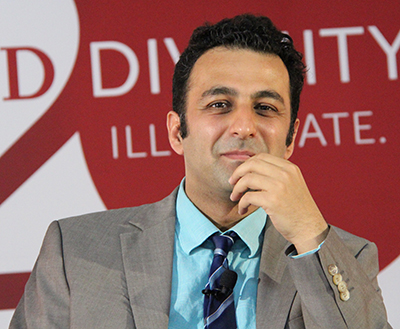In 2017, the Baha’i community worldwide commemorated a momentous occasion—the bicentennial of the birth of Baha’u’llah, the founder of the Baha’i Faith. This centenary celebration resonates with profound significance, epitomizing a pivotal moment of introspection and exploration within the context of unity. The striking emergence of this event at prestigious locales, notably Harvard, provides an opportunity to engage in an enriching discourse regarding the tenets of Baha’i teachings. Such principles, woven intricately into the very fabric of human existence, hold promise for reshaping global perspectives.
The principal ethos of the Baha’i Faith revolves around the concept of unity: unity among peoples, religions, and nations. This notion is not merely an abstract ideal; it serves as a guiding philosophy within Baha’i teachings and constitutes the imperative for humanity’s evolution. Baha’is ardently believe that the advancement of civilization rests upon a foundation of unity rather than division. As scholars, students, and community members congregated at Harvard to reflect upon this central theme, they were beckoned to ponder questions entwined with the essence of their shared humanity.
In contemplating the rich historical context of the Baha’i Faith, one should consider the conditions that led to its foundation in the mid-19th century. The world was beset by tumult and strife, with social, political, and religious divisions tearing societies apart. Baha’u’llah, through his writings and teachings, proposed that these schisms could be bridged through love and understanding. This notion of unity challenges prevailing paradigms that emphasize differences, inviting individuals to reframe their perspectives and recognize a shared responsibility towards collective well-being.
At the heart of Baha’i teachings lies the principle of the oneness of humanity. This doctrine posits that all human beings, irrespective of race, ethnicity, or creed, belong to a single global family. The implications of this principle are immense, as they call for an abandonment of prejudices and the fostering of harmonious relationships within diverse populations. Through discussions on campus, participants were encouraged to engage with this transformative idea, contemplating its feasibility within contemporary society plagued by polarization.
Furthermore, the bicentennial celebrations at Harvard provided an opportune moment to reflect upon the intersections of science and religion within the Baha’i worldview. Baha’is assert that true science and true religion must coincide, as both seek the truth of our existence from different vantage points. The interplay between these domains emerges as a critical aspect, engendering an environment ripe for dialogue. In a time where many perceive an insurmountable chasm between scientific inquiry and spiritual understanding, Baha’i teachings advocate for collaborative exploration. Such an approach not only piques curiosity but also encourages interdisciplinary discourse that transcends conventional academic boundaries.
Inherently tied to this dialogue is the notion of justice, a fundamental precept within Baha’i teachings. Justice is viewed as an instrument through which truth and righteousness prevail. Upholding justice involves recognizing the dignity of every individual and ensuring equitable opportunities for all. Baha’is participate in myriad initiatives aimed at fostering social justice, aligning with the cause of global equality. The conversations initiated during the bicentennial at Harvard encouraged participants to examine their role in championing justice, emphasizing that the pursuit of a just society must be a shared endeavor.
Additionally, the celebration served as a reminder of the importance of education within the Baha’i framework. The Baha’i Faith places immense value on education, considering it not merely a means of acquiring knowledge but as a transformative agent for personal and societal upliftment. The teachings emphasize the empowerment that education affords individuals, particularly marginalized populations. Harboring a vision for universal literacy and access to knowledge, Baha’is engage in diverse educational pursuits, with a pronounced focus on nurturing moral and spiritual capacities alongside intellectual development. This perspective reframes education as a communal responsibility, advocating for collaborative learning processes that enhance collective intelligence.
Moreover, during the bicentennial celebrations at Harvard, themes surrounding equality—particularly gender equality—were fervently discussed. The Baha’i teachings proclaim that men and women are equal partners in the advancement of society. This radical perspective, positing that societal progress is inextricably linked to the empowerment of women, invites communities to challenge entrenched gender norms. The conversations fostered an environment of inquiry, urging participants to critically consider the societal structures that silence voices and perpetuate inequality.
The bicentennial of the Baha’i Faith at Harvard culminated in a tapestry of dialogues, reflections, and artistic expressions. The integration of art and culture within the celebrations illuminated the significant role that the arts play in unifying humanity. Art serves not only as a medium for individual expression but also as a conduit for communal understanding. Participants were invited to reflect on how the arts can facilitate cross-cultural dialogue, appealing to the heart and mind in ways that words often cannot achieve.
As the Baha’i Faith continues to evolve in contemporary discourse, the bicentennial at Harvard stands as a testament to the ongoing journey toward unity. In providing an environment conducive to thoughtful reflection and spirited conversation, the celebration beckons individuals to witness the profound potential inherent in the teachings of Baha’u’llah. Through the pursuit of unity, justice, and education, a promising shift in perspective emerges—one that urges humanity to rise above its divisions in favor of a shared destiny. The celebration at Harvard was not merely a commemoration of the past, but rather a clarion call for each of us to transcend our limitations and contribute to a more unified world.
